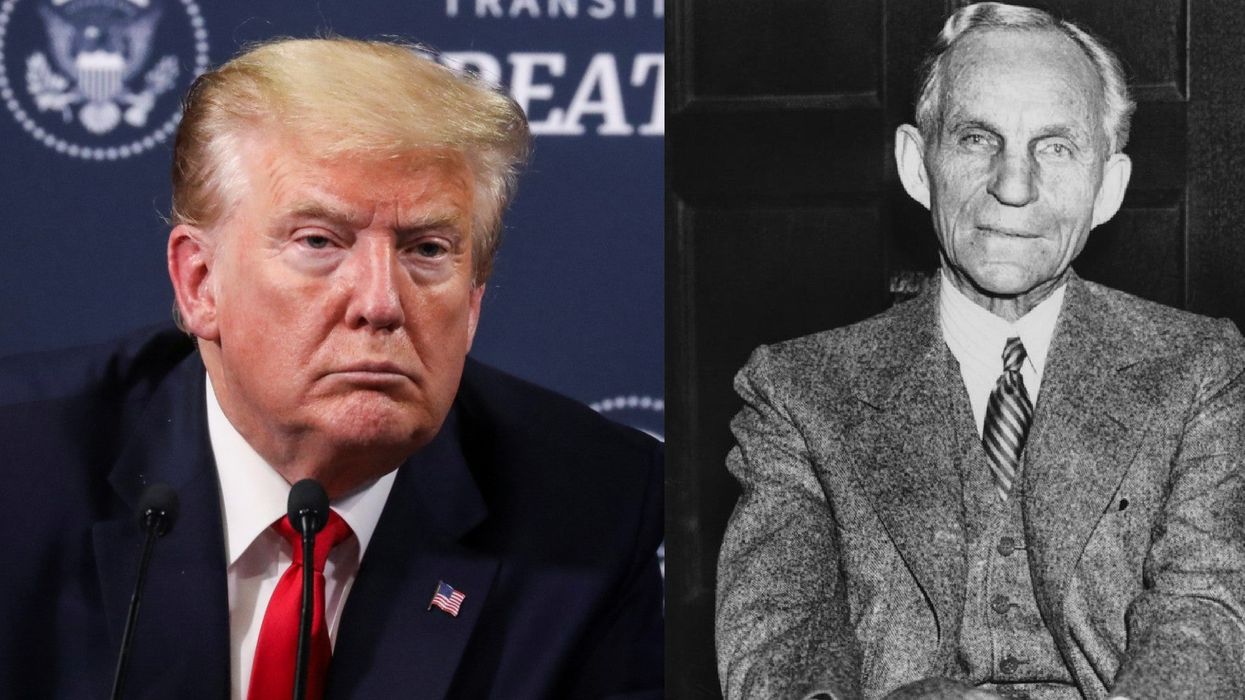News
Greg Evans
May 23, 2020
This week, Donald Trump travelled to Michigan to visit the Ford car plant to observe how the company has adapted to producing face shields and ventilators to help combat the coronavirus.
After having a tour of the factory, sans advised face mask, Trump gave a speech to the employees where he began to recite the history of the company before appearing to ad-lib to praise its founder, Henry Ford who passed away in 1947.
Trump began reading a prepared statement before trailing off to praise Ford's 'good bloodlines.'
The company founded by a man named Henry Ford -- good bloodlines, good bloodlines, if you believe in that stuff. You got good blood.
Trump's good blood' statement appeared to be directed Ford's great-grandson, William Clay Ford who was watching the speech.
On the surface there didn't appear to be much wrong with this but many on social media began to point out that Trump's praise of Ford was somewhat problematic.
Ford's comments on Jewish people are well documented and are probably best noted for a series of articles published by his own newspaper, The Dearborn Independent in 1920.
The paper lead with the headline 'The International Jew: The World's Problem' which compiled around 90 antisemitic articles, mostly inspired by 'The Protocols of the Elders of Zion' a notorious ancient forgery which was first published in Russia in 1903 and is believed to be Hitler's justification for the Holocaust.
Copies of the book were sent to schools and libraries around the United States before being made into a book. Some of the articles are said to have promoted typical antisemitic stereotypes about Jewish people controlling the world's finances and having a strong influencer over governments.
Ford retracted his views later that decade after the Jewish-American activist Aaron Sapiro sued him for libel in a federal court after Ford's newspaper smeared Sapiro.
However, by this point, Ford's views had already made a significant influence with Adolf Hitler praising the businessman in 'Mein Kampf, who wrote:
It is Jews who govern the stock exchange forces of the American Union. Every year makes them more and more the controlling masters of the producers in a nation of one hundred and twenty millions; only a single great man, Ford, to their fury, still maintains full independence.
In 1938, with the Nazi's now in power and the world on the cusp of war, Ford accepted the Grand Cross of the German Eagle, which at the time was the highest honour the Nazi regime could bestow upon someone. This fell on the occasion of Ford's 75 birthday and according to The Intercept, he received a personal message from Hitler, which was handed to him by the two guards that gave in the cross.
Ford continued to make critical remarks about the Jewish community blaming them for a variety of subjects including fashion and music trends as well as the war. The Henry Ford Museum notes:
The most controversial and least admirable aspect of Ford’s career was his descent into anti-Semitism.
Convinced that 'bankers' and 'the Jews' were responsible for a whole range of things he didn’t like, from the world war to short skirts to jazz music.
The museum, which doesn't deny that Ford held these views does suggest that his personal secretary Ernest Liebold, as well as his newspaper editor William Cameron also harbored similar feelings and pushed Ford to allow them to publish 'The International Jew'. Cameron had replaced E.G. Pipp, who had resigned in protest over the series.
However, Ford's views were not as popular as he would have perhaps perceived in 1920s America and there was a huge backlash after the newspaper was published and distributed. Public libraries removed copies of the newspaper and some Ford dealerships also refused to carry copies. There was also a call to boycott Ford vehicles. In 1922, Ford stopped the series before rebooting it in 1927 which then led to the aforementioned Sapiro libel case.
Shockingly, The International Jew remained in publication for many decades after and as recently as the late 1990s could be found in countries like Egypt and Russia. It is also used in countries like the UK, Brazil and Germany for research reasons and to educate people on the dangers of antisemitism.
Now almost 200 years later, the president of the United States is praising Ford's legacy and his 'bloodline' which is hardly the first time that Trump has been criticised for making remarks that have been perceived as antisemitic. Trump's most recent comments have prompted a reaction from Jonathan Greenblatt, the CEO of the Anti-Defamation League who demanded an apology from the president.
Top 100
The Conversation (0)














